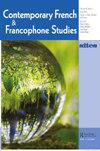Selma Sardouk的Mäli-Mäli分析
IF 0.2
4区 文学
0 LITERATURE, ROMANCE
引用次数: 0
摘要
摘要本文以塞尔玛·萨杜克的非殖民化播客《Mäli-Mäli》为主题,分析了网络女权主义的政治功能。从该节目的第一季开始,正在研究的剧集就集中在集体神经症上,与法国几代北非移民儿童的跨性别创伤管理对话。本文章由计算机程序翻译,如有差异,请以英文原文为准。
Une analyse de Mäli-mäli de Selma Sardouk
Abstract The analysis focuses on the political function of cyberfeminism, taking as its subject the decolonial podcast Mäli-mäli by Selma Sardouk. From the first season of the program, the episodes under study focus on collective neuroses, in dialogue with the management of transgenerational traumas in France, among generations of children from North African immigration.
求助全文
通过发布文献求助,成功后即可免费获取论文全文。
去求助
来源期刊

Contemporary French and Francophone Studies
LITERATURE, ROMANCE-
CiteScore
0.30
自引率
0.00%
发文量
43
期刊介绍:
An established journal of reference inviting all critical approaches on the latest debates and issues in the field, Contemporary French & Francophone Studies (formerly known as SITES) provides a forum not only for academics, but for novelists, poets, artists, journalists, and filmmakers as well. In addition to its focus on French and Francophone studies, one of the journal"s primary objectives is to reflect the interdisciplinary direction taken by the field and by the humanities and the arts in general. CF&FS is published five times per year, with four issues devoted to particular themes, and a fifth issue, “The Open Issue” welcoming non-thematic contributions.
 求助内容:
求助内容: 应助结果提醒方式:
应助结果提醒方式:


